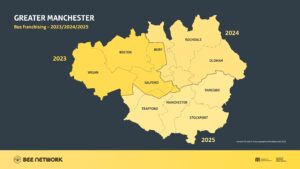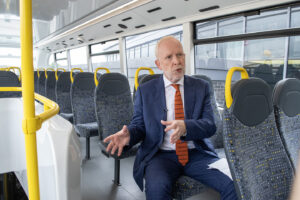Pioneering Bee Network marks one year anniversary with record numbers of people travelling on cheaper, cleaner, more reliable buses
24th September 2024, 4:10 pm
- 12 months since Greater Manchester made history as the first area to bring buses back under local control in almost 40 years
- Record numbers now using cheaper, cleaner, more reliable bus services, helping connect more people to jobs, education and leisure opportunities
- Bee Network creating new jobs in Greater Manchester and across the UK, and cutting pollution through improvements in the bus fleet
Buses are the cornerstone of the Bee Network and since its historic launch a year ago, more than 58 million bus journeys have been made on cheaper, cleaner, more reliable bus services.
Since the distinctive yellow buses were first launched in Bolton, Wigan and parts of Salford and Bury, nearly seven million more journeys* have been made on the city region’s buses compared with the previous year (a 5% increase).
Local control of buses is part of a plan to grow the Greater Manchester economy by providing better, more affordable public transport and making it easier for people to travel by foot, bike or wheelchair.
By connecting more people with education, leisure and work opportunities, the Bee Network is helping unlock the city region’s growth potential. In the coming years, it will also help tackle the housing crisis by unlocking new locations across Greater Manchester to build new housing at scale.
Greater Manchester Mayor Andy Burnham said: “A year ago, we made history as the first area to bring our buses back under local control in almost 40 years. Today, we can see the progress we’ve made, with bus services now cleaner, cheaper and more reliable than before and record numbers of passengers using the Bee Network.
“The age and standard of our buses is better than ever, we’ve more staff, we’re keeping fares low and have launched more night buses for those working in our nighttime economy.
“The Bee Network is also delivering new jobs and apprenticeships both here in Greater Manchester and across the UK. And having control of our buses also means we can fund free bus travel for 16 to 18-year-olds. So, the cost of bus ticket need not be a barrier to work or study opportunities.
“As our pioneering Bee Network goes from strength to strength, it’s no surprise that others are looking to follow in our footsteps and that local control of buses is now a major national policy.”
Louise Haigh, Secretary of State for Transport, added: “Greater Manchester has been a pioneer in the effort to deliver better buses. Just one year on from its launch, the Bee Network has become a model for reliable, affordable and integrated public transport services.
“That’s why I made sure my very first official visit as Transport Secretary was to see the brilliant Bee Network in action.
“This Government is committed to ensuring these same successes are replicated across the country, by breaking down barriers to delivering better buses and giving local leaders the tools they need to deliver for their communities.”
Driving major benefits as part of a phased rollout
Following the launch in September 2023, buses in Oldham, Rochdale and parts of Bury, Salford and north Manchester also joined the Bee Network in March this year, representing around half of all buses in the city region, or 328 bus routes (188 routes in phase one and 140 routes in phase two). The remaining 253 bus services will come under local control on 5 January 2025.

The move has enabled improvements that would not have happened under the old deregulated system, run by commercial operators. Key benefits from one year of Bee Network buses include:
- Fares are lower: The Bee Network is making travel cheaper, with the £2 fare cap saving bus passengers almost 20% and cheaper weekly, monthly and annual tickets coming in January.
- More buses turning up on time: Buses in the first areas to come under local control are consistently more reliable than before franchising, with services in phase one areas now consistently above 80% punctuality. Between June and August 2024, punctuality of phase one services was 86.5% compared to 70.5% for the equivalent pre-franchising period.
- More people are travelling by bus: 58,590,537 passenger journeys have been made on the Bee Network (between 24/9/23 and 14/9/24). Record-breaking patronage figures were set on two consecutive days in September, with 305,000 journeys recorded on a single day (5th September).
- New 24-hour routes: The recently launched trial of night buses is proving popular with people enjoying and working in the night-time economy.
- More money from fares: Revenues from buses in the first phase of the Bee Network exceeded £20m. That’s £3m higher than budgeted (between 24/9/23 and 31/3/24). Franchising is also costing a third less per km than services that were being tendered before franchising began.
- New buses and better standards: The average age of buses in Bolton, Wigan and parts of Salford and Bury is 4.7 years, compared with an average age of 8.6 for the Greater Manchester bus fleet in 2018, with 10% of buses now electric – up from less than 1% before franchising.
- Greater customer satisfaction: Satisfaction with fares has jumped from 63% in 2022 to a record high of 82% (based on TfGM fares survey and since the inception of the survey in 2016).
- Real time travel updates: The Bee Network app** allows users to plan their journeys, track buses across Greater Manchester, access live departure times, find their nearest bus or tram stop and leave feedback via Rate My Journey.
- More buses are on the roads: An extra 20 buses were introduced to the phase one area to improve punctuality, reliability and provide extra capacity – leading to rising passenger numbers. More are planned for the phase two area this year and early 2025.
- More measures to increase safety: 69 new TravelSafe Support and Enforcement Officers have been introduced across the franchised network to provide a reassuring, visible presence for the travelling public, with more to follow in January.
- Jobs are being created through franchised contracts: Bus operators have hired 179 apprentices and Rochdale firm Mellors is one of three UK manufacturers building Bee Network buses, with orders helping to fund the creation of 15 new apprentice roles there too.

Vernon Everitt, Transport Commissioner for Greater Manchester said: “The Bee Network has been a huge undertaking for Greater Manchester but, only one year in, we are already reaping the rewards for blazing a trail and taking our buses under local control.
Chris Fletcher, Policy Director at Greater Manchester Chamber of Commerce added: “It is truly remarkable the impact that the Bee Network has had in the last 12 months and shows the benefits of having genuine local control over what is still the main form of public transport in the country.”
“For businesses, having an effective, co-ordinated and cost effective public transport network is critical to not only let their current employees get to work but it allows them to look to a wider catchment area for recruiting new staff. Likewise for people looking to access job-critical training or new job opportunities, more people now have more access to work and training options than ever before which will help Greater Manchester’s growth ambitions.”
“The recent introduction of the night services has created a high degree of interest from a number of businesses, reliant on shift workers and having full control means that initiatives like this can be put in place to create a truly unique service that is right for GM’s business and residents.”
Contact Information:
| Transport for Greater Manchester Press Office
0161 244 1055 |
Next Article
Chartered Accountants and Business Advisors Beever and Struthers advise on another cross-border transaction with the sale of Heathside Trading to European-owned SAGA Invest